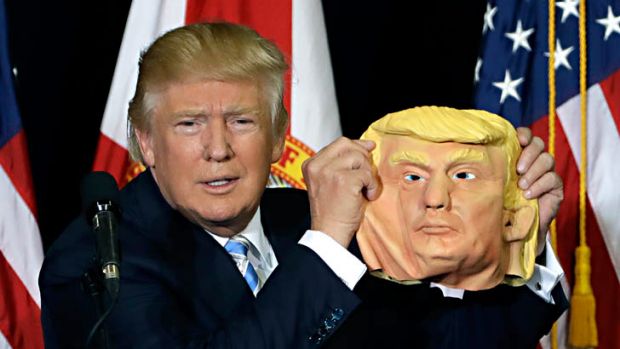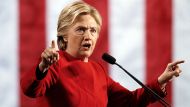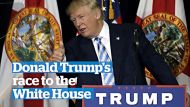Pennsylvania: It used to be a truism of American politics that Hispanic voters, though growing in number, did not turn out to vote. The hard right former Arizona governor Jan Brewer boasted exactly that last month in the face of suggestions that Donald Trump's promise of mass deportations might cost Republicans the election.
"They don't get out and vote. They don't vote," Brewer, a staunch supporter of race-based police round-ups told The Boston Globe.
More News Videos
Final day frenzy for Donald Trump
With just one day left before the US presidential election, Republican nominee Donald Trump rallies supporters in Sarasota, Florida, keeping up his attacks against rival Hillary Clinton.
But early voting data suggests that Donald Trump, who launched his campaign calling Mexicans rapists, has awoken a sleeping electoral giant, one that might already have cost him the election.
By some estimates more Hispanics had voted in Florida by the weekend than voted in the entire 2012 election. Without the state of Florida, where an aggregate of polls find the two candidates in a statistical tie, few analysts can see how Trump can win at all.
By Saturday evening 911,000 Hispanics have voted — more than a third of whom did not vote in 2012. "We're witnessing explosive early voting turnout of Hispanics — both those newly registered to vote as well as those who sat on the sidelines in 2012," Dan Smith, a University of Florida political science professor told The Miami Herald.
On Friday in Little Havana, Miami, Vincente Blanco-Capote, a veteran of the CIA-backed invasion of Cuba by anti-Castro refugees proudly showed Fairfax Media a photograph of himself standing with Trump the day that the candidate came to accept the veterans' association first ever official endorsement.
He said Cuban Americans had not forgiven the Democratic Party for what they consider to be John F Kennedy's betrayal of their force during the failed invasion.
Nor could the association accept President Barack Obama's decision to reopen diplomatic ties with Cuba.

But younger Cuban Americans do not universally share their parents' and grand-parents' Cold War politics. One younger Cuban American told Fairfax Media that her family might one day return to the Republicans, but would not vote for Trump.
Another concern for the Trump campaign is that Florida's Hispanic demographic is changing shape, with the number of Puerto Ricans calling the state home increasing by 110 per cent since 2000. Like other Latino groups, Puerto Ricans are overwhelmingly rejecting the Trump-led Republican Party.

Nevada
On Monday morning in Nevada, a state won by Mitt Romney in 2012, the leading analyst and commentator Jon Ralston wrote a blog post saying bluntly that Trump had already lost the state in early voting, in part due to a surge in Hispanic turnout.

"I repeat: Trump is dead here, barring a miracle or anomalies invisible not just to me, or many other experts. (I surveyed 14 smart insiders this weekend. All 14 said Trump loses the state.)" he wrote.
The surge in Hispanic voting is already causing recriminations against not only the Trump campaign, but the broader Republican leadership.

Mike Fernandez, a Cuban-American billionaire and Republican donor from Miami who is supporting Clinton, wrote an email Sunday to other Republicans, entitled the "The Trump Gangrene."
"Our faithful Republican friends have been so attached to the days of Leave It to Beaver that they have ignored each true friend telling them 'Our world has changed and we better adjust because this is serious.' But they told us, 'we know better, we know best,'" the Miami Herald reported.

"Unless there is a complete restructuring of the Republican leadership structure, we will die from an infection which was ignored."









